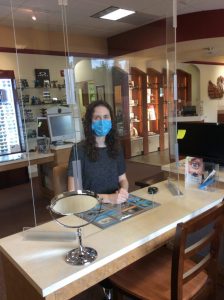Due to COVID-19, the amount of ‘screen time’ has increased significantly, as online education and Zoom are now part of everyday life.
Almost 60 percent of people who use computers and digital devices daily experience digital eye strain, including sore eyes, headaches, tiredness or loss of concentration.
Here are 5 tips to reduce your risk of eye strain affecting your daily life:
1. Frequent eye exams
Let your eye doctor know if you are experiencing any symptoms listed above. Frequent eye exams are the most important thing you can do to reduce the impact eye strain is having on your life.
2. Reduce glare
Glare from light reflecting off walls and finished surfaces, as well as reflections on your computer screen also can cause eye strain. Using an anti-glare screen on your screen may also reduce reelected glare off the display.
3. Avoid dry eyes
Dry eyes are common when using computers for extended length of time. When using a computer the eyes can dry out, due to blinking less often and air conditioning. When staring at a screen, people blink less frequently, up to 66% less than they normally do and tears can also evaporate due to air conditioning.
If you experience dry eye symptoms, schedule an appointment with an eye doctor near you to discuss artificial tears or other eye lubricants.
SEE RELATED: Protecting your Eyes from Blue Light
4. Walk away
To reduce your risk for computer vision syndrome and neck, back and shoulder pain, it is recommended to walk away – from your screen. Taking frequent screen breaks at least one 10-minute break every hour, will allow your eyes to relax.
During these breaks, stand up, walk for 5 minutes, and also stretch your arms, legs, back, neck and shoulders to reduce tension and muscle fatigue.
5. Computer glasses
Customized computer glasses can be prescribed by eye doctors, these often provide the greatest relief from digital eye strain.
Computer glasses also are a good choice if you wear bifocals or progressive lenses, because these lenses generally are not optimal for the distance to your computer screen.
Computer glasses can also include blue light lenses and anti-reflective (AR) coating, which also reduces glare.
LEARN MORE: Guide to Eye Exams
If you experience scratchy, dry eye whilst using a computer schedule an appointment with an eye doctor near you to discuss artificial tears or other eye lubricants.









